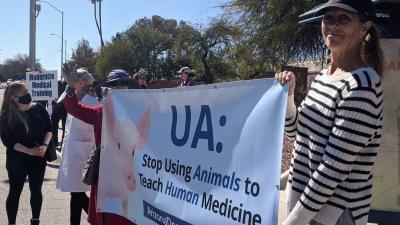Physicians Committee’s Comprehensive Engagement With the NIH About Its Next Strategic Plan

The Physicians Committee has been actively engaging with the National Institutes of Health (NIH) to promote human-centered, nonanimal research in its next strategic plan.
The NIH-Wide Strategic Plan is a key coordinating and goal-setting document for the agency. It is mandated by Congress to be developed every six years to provide direction to biomedical research, facilitate agency-wide collaboration, leverage scientific opportunity, and advance biomedical science. In preparation for the development of the NIH-Wide Strategic Plan for 2026-2030, the Physicians Committee has urged NIH leadership and the NIH Division of Program Coordination, Planning, and Strategic Initiatives (DPCPSI) to set an agency-wide priority to advance the development and use of human-centered, nonanimal research.
In September, the Physicians Committee submitted a comment to the NIH Council of Councils, which advises DPCPSI. In November, Physicians Committee experts met with DPCPSI staff to discuss the implementation of an NIH advisory group’s recommendations for catalyzing the development and use of new approach methodologies—research methods derived from human cells, tissues, and data that model human biology and disease more accurately than animals. Much of this implementation is being conducted through the exciting new Complement-ARIE program, but one recommendation in particular may be better suited for the NIH-Wide Strategic Plan. The first and foremost recommendation made by the group was to prioritize the development and use of new approach methodologies. What better way to do this than through the formal priority setting exercise of strategic planning?
Later in November, 338 physicians, scientists, and advocates joined the Physicians Committee in sending a letter to NIH director Monica Bertagnolli and DPCPSI deputy director Tara Schwetz. The letter urged these leaders to build on the recent progress the NIH has made to advance human-centered research and to ensure that the development and implementation of the strategic plan further promote this research.
In December, the Physicians Committee submitted a comment to the Advisory Committee to the Director, reiterating these requests, as this important committee will soon be thinking more deeply about the strategic planning process. This comment is embedded below.
The Physicians Committee will continue to monitor the development of the next NIH-Wide Strategic Plan and engage with the agency as appropriate. Through this work, we will ensure that human-centered research is prioritized and that progress in the shift away from unreliable animal research is maintained.








